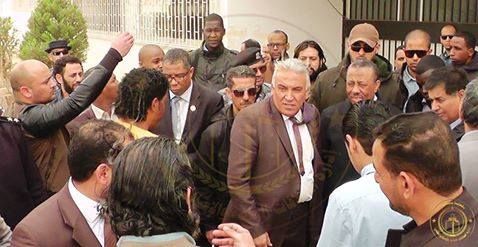By Aiman Amzein.

Benghazi, 28 February 2016:
Accompanied by most of his cabinet, Prime Minister Abdullah Al-Thinni flew to Benghazi today to take . . .[restrict]stock of the situation following the military action against the so-called Islamic State (IS) and other militants and to get a first-hand account of reconstruction needs in the city.
The other aim was to ensure that the security services have as much back-up as can be provided.
Despite the Benina Airport’s manager yesterday saying that it would remain closed for the time being, Thinni and his delegation flew in – and early enough to avoid a major ghibli (sand storm) which hit the region later during the day causing flights to Labraq to be cancelled.
Thinni was accompanied by second Deputy Prime Minister Abdulsalam Al-Badri who is in charge of public utilities, as well as the Interior, Local Government, Economy, Industry and Trade and Labour and Social Affairs ministers, and the heads of some state authorities.
They were welcomed by Benghazi mayor Omar Barasi and other members of the council.
After discussions about Benina airport’s reconstruction requirements, Thinni and the ministers went to both Leithi and Buatni to see for themselves the damage and to talk to returning residents about their needs and hopes.
Talks with the municipal council covered healthcare, electricity, water, sanitation, education and emergency accommodation for those whose homes have been damaged as well as an emergency budget for the city.
Paying tribute to the armed forces for their efforts in freeing the city from militants’ grasp, Thinni said that Benghazi was but the first stop in smashing terrorists across the country.
“For in the past two years there has not been a day that passes where all we have heard about has been assassinations in broad daylight – in mosques or streets, in front of homes and in cars.” But with the launch of Operation Dignity dignity and thanks to its leadership, he said, the city was finally getting back to normal.
During the visit he announced that LD 166 million would be allocated to dealing with the electricity problems, LD 140 million for the health sector, LD 25 million for addressing education issues, and LD 35 million for 450 housing units for displaced people.
There was also a meeting on security, held at the headquarters of the Arabian Gulf Oil Company. [/restrict]











